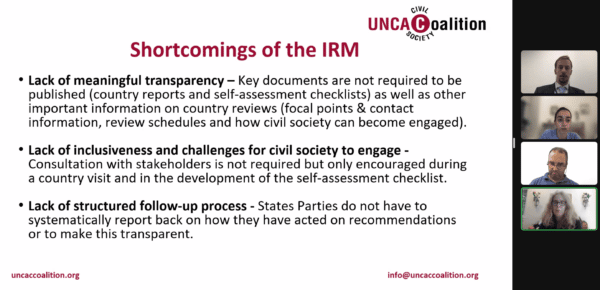15 July 2022-
What is the potential of the OGP initiative in terms of combatting corruption in an inclusive manner? How is its implementation mechanism functioning, and what is the impact on the participating MENA countries? These were some of the questions that were raised during the sixth regional meeting of the members of the UNCAC Coalition’s Middle East and North Africa region on 7 July, which focused on the Open Government Partnership (OGP) initiative and its contribution to the fight against corruption.
As usual, the meeting began with news from the Coalition’s Vienna Hub, including an update on the process of drafting the updated report on strengthening the UNCAC Implementation Review Mechanism (UNCAC IRM), and on the latest available tools on the UNCAC Coalition website, namely a database compiling all civil society parallel reports on UNCAC implementation supported by the Coalition, as well as the UNCAC Review Status Tracker which compiles all the relevant and available information on UNCAC country reviews.

The OGP Initiative and its Relevance to the Fight against Corruption
The second part of the meeting was dedicated to the Open Government Partnership Initiative and how it contributes to the fight against corruption. MENA Regional Coordinator, Karim Belhaj Issa, presented the theoretical foundations of the initiative and its development; the OGP was presented as a multilateral initiative and was announced on 20 September 2011, during the annual opening session of the United Nations General Assembly in New York, by eight countries: Brazil, Indonesia, Mexico, Norway, the Philippines, South Africa, the United Kingdom, and the United States. Since its inception, the number of countries that are part of it has quickly grown to 77 country members and 106 jurisdictions to date, including Jordan, Morocco, and Tunisia.
The main objectives of the initiative are to push the member countries to enshrine the principles of open government in public structures, adopt a transparent governance approach, involve citizens in the formulation of public policies, and combat corruption through the use of communication and information technologies.
While the concept of ‘open government’ could be defined quite broadly, it is often associated with principles of transparency and government accountability. The Institute for Government Quality at the University of Gothenburg, Sweden, limits the definition to the government’s openness to information released by the government or the extent to which citizens can request and receive information that has not already been published. Harlan Yu and David J. Robinson, however, define open government in terms of service delivery and public accountability. They argue that technology can be used to facilitate the disclosure of information. The Organization for Economic Co-operation and Development (OECD), for instance, is moving closer to open government through full government coordination, civic engagement, access to information, budget transparency, integrity and anti-corruption, use of technology, and local development.
The OGP initiative is managed by a steering committee composed mainly of representatives from the highest level of government of the member countries (minister’s rank) and representatives of international CSOs. The Committee is currently chaired by four chairpersons, two representing the governmental side, France and Georgia, and two representing the civil society side, the World Resources Institute, and the Open Democracy Advice Centre. Joining this partnership requires adherence to minimum standards, ensuring that member countries respect the principles of open government and are practically enshrined in the form of concrete initiatives. These conditions are reflected in evaluation criteria aiming to measure countries’ progress in this area and are classified into four axes related to Fiscal transparency; The right of access to information; the Declaration of income and assets by public officials, and Participation and protection of civil liberties.
OGP Implementation Mechanism & MENA Engagement
The OGP remains among the most effective mechanisms for contributing to an environment that rejects corruption, although limited in terms of country participation and impact in the MENA region. Members of the OGP have introduced a number of anti-corruption reforms. The OGP action plans included several anti-corruption commitments in critical areas such as open contracting, public procurement, beneficial ownership transparency, political integrity, whistleblower protection, and asset recovery. The initiative requires the participating countries to make a number of commitments within the framework of a two-year action plan under the supervision of a participatory follow-up committee, which includes representatives of civil society and the government responsible for implementation. These commitments are clustered into three main pillars: supporting transparency, supporting accountability, and supporting participation. The UNCAC Coalition recently published a discussion paper comparing good practices from anti-corruption review mechanisms, including drawing on practices from the OGP reporting mechanism.
Ali Sedky, from the Coalition’s member NGO Moroccan Transparency Organization, presented the Moroccan experience in implementing the OGP action plans and how it contributes to the fight against corruption. He mentioned that despite all the difficulties, including the limited participation of civil society and the general lack of openness of the government, the country’s action plan contributed to supporting transparency through the launch of several electronic platforms that provide access to official information in open data formats. Karim Belhaj Issa presented a summary of the Tunisian experience in this field, where the various action plans that have been applied contributed to closing gaps in the legal framework as part of the Government’s follow-up on the recommendations of its UNCAC Implementation 1st cycle country review.



